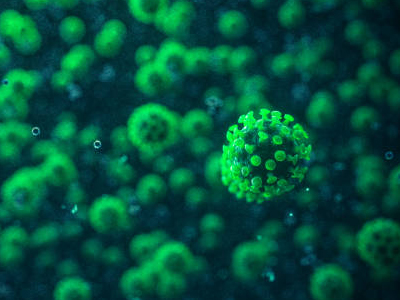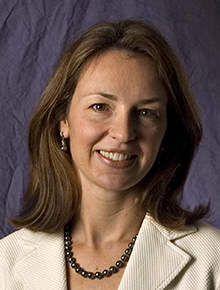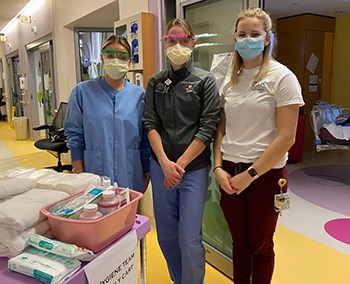News from Pediatrics
News from Pediatrics
UR Medicine Golisano Children’s Hospital Launches New Center to Help with Pediatric COVID-19 Testing
Monday, October 25, 2021

In an effort to help schools and primary care practices with the high volume of children requiring COVID-19 tests, UR Medicine Golisano Children’s Hospital have launched a new referral-based COVID testing center with 24-48 hour results, allowing faster return to school for children who present with COVID-like symptoms.
The site is not a walk-in clinic and requires a healthcare provider issue an order for testing. Site staff will communicate results directly to the family and school, with signed consent.
Located at Southview Commons and open Monday-Friday, the testing center has been operational since October 13, 2021. This program is part of an overall collaborative community strategy, led by primary care pediatric and family medicine practices and supported by the healthcare systems, county departments of health, and schools, to ensure appropriate assessment and COVID testing is in place to keep children safe and in school.
“Balancing work, school and life demands is difficult in the middle of the COVID-19 pandemic. In an effort to help families manage common childhood illnesses and minimize time lost from work, school, or child care, UR Medicine Golisano Children’s Hospital is offering a dedicated team and site to have children tested for COVID-19.” said Neil Herendeen, M.D., professor in the Department of General Pediatrics at URMC. “Many children need to be evaluated by their healthcare provider for illness symptoms and some practices have testing available. Parents’ first step is to talk to their child’s primary care office to decide the best course of action.”
URMC Professor Elected to Lead Prestigious Research Society
Wednesday, March 17, 2021
Kate G. Ackerman, M.D., senior vice chair of innovation & integration and an associate professor of pediatrics and biomedical genetics at the University of Rochester Medical Center (URMC), has been named president-elect of the Society for Pediatric Research (SPR).
Dr. Ackerman’s work epitomizes what we look for in translational research: making vital discoveries that directly benefit the treatment of children. With her passion for discovery and dedication to advancing pediatric research, she will be a great asset in helping the SPR grow.”
During Ackerman’s term as president elect, president, and past president, June 1, 2021 – June 1, 2024, she will work to grow the SPR - a multi-disciplinary network of diverse researchers dedicated to improving child health – and serve its membership. “I am honored at being elected for this important position, and I look forward to advancing the collaborative mission of pediatric research in an ever changing health care environment”.
With more than 4000 active members, the SPR is the primary organization for pediatric research across all academic institutions in the United States. The organization is dedicated to facilitating active communications among and between researchers, promoting research collaborations through mentoring and knowledge sharing, and advocating for funding and policies supportive of pediatric research. Ackerman has been an SPR member since 2006 and has served as the Strategy and Operations Officer (2014-2018), as a committee member (SPR executive, finance, communications, PAS Content), and as the Secretary of the International Pediatric Research Foundation (current). She is also the 2018 recipient of the SPR Thomas Hazinski Distinguished Service Award, which honors an individual who has provided exceptional service to the society.
 Ackerman has more than 20 years of research expertise in both bench and clinical sciences, and she has a long-term interest in understanding genetic mechanisms of rare critical illness. Formally trained in mouse genetics, she was the first to identify a genetic cause of non-syndromic defects of the lung and diaphragm (congenital diaphragmatic hernia) and is considered an expert on development of the diaphragm. Her diverse experience allows her to contribute to many groups that benefit from combining knowledge of bench research with clinical medicine. She serves on the Scientific Board of Counsellors for the NICHD and has recently chaired the Mouse Genome Database Scientific Advisory Board. She recently co-founded the National Pediatrician Scientist Collaborative Workgroup (NPSCW), a group of leaders in research training and medical education that works on innovative methods to promote research training during residency.
Ackerman has more than 20 years of research expertise in both bench and clinical sciences, and she has a long-term interest in understanding genetic mechanisms of rare critical illness. Formally trained in mouse genetics, she was the first to identify a genetic cause of non-syndromic defects of the lung and diaphragm (congenital diaphragmatic hernia) and is considered an expert on development of the diaphragm. Her diverse experience allows her to contribute to many groups that benefit from combining knowledge of bench research with clinical medicine. She serves on the Scientific Board of Counsellors for the NICHD and has recently chaired the Mouse Genome Database Scientific Advisory Board. She recently co-founded the National Pediatrician Scientist Collaborative Workgroup (NPSCW), a group of leaders in research training and medical education that works on innovative methods to promote research training during residency.
Ackerman joined URMC in 2007 as an assistant professor and was promoted to associate professor in 2011. She will be promoted to full professor on June 1. Before joining URMC, Ackerman served in multiple progressive roles at Boston Children’s Hospital for more than 9 years, first as a fellow in anesthesia (critical care), then as both instructor and assistant professor in Pediatrics. While working at Boston Children’s, she served a concurrent role from 2001-2007 as research associate in Genetics as part of her post-doc education at Harvard Medical School.
Ackerman received her B.S. from Cornell University and her M.D. from the State University of New York at Buffalo, School of Medicine & Biomedical Sciences. She is currently an M.B.A candidate at the University of Rochester, Simon Business School with expected graduation in May 2021.
Ackerman’s accomplishments both as a leader and research innovator make her an ideal choice to lead the SPR, according to Patrick Brophy, M.D., chair of the Department of Pediatrics.
“Dr. Ackerman’s work epitomizes what we look for in translational research: making vital discoveries that directly benefit the treatment of children. With her passion for discovery and dedication to advancing pediatric research, she will be a great asset in helping the SPR grow.”
Mobile ‘Hygiene’ Team Helps PICU Nurses Treat Adult Patients During COVID Surge
Monday, February 8, 2021
When COVID-19 hospitalizations started accelerating in Monroe County last November, space became a premium for treating ICU patients at URMC. Units across the hospital had to be repurposed as the virus surged throughout the community.
 The Pediatric Intensive Care Unit (PICU) teams at Golisano Children’s Hospital (GCH) were ready to answer this challenge. A low census at GCH – due to decreased volumes of patients with seasonal respiratory illnesses like RSV – meant that space was available for adults. In late December, caregivers on the 6N and 6S units started a rapid transition to treating adult patients who had recovered from COVID, but still needed ICU care.
The Pediatric Intensive Care Unit (PICU) teams at Golisano Children’s Hospital (GCH) were ready to answer this challenge. A low census at GCH – due to decreased volumes of patients with seasonal respiratory illnesses like RSV – meant that space was available for adults. In late December, caregivers on the 6N and 6S units started a rapid transition to treating adult patients who had recovered from COVID, but still needed ICU care.
“We went from having five or six patients to a full census, including six adults, in about six hours,” said Laurie Athans, director of Pediatric Nursing
As part of their care regime, PICU nurses provided regular bed baths – washing a patient who is in bed, turning them, and inspecting their skin – for adult COVID patients. Bed baths are an overlooked, but critical, part of daily care. “Skin is the largest organ, and you have to make sure patients are turning from side to side and are clean,” said Athans. “This prevents pressure ulcers, as well as respiratory complications, because if people aren’t moving, fluid can settle in their lungs and increase the risk of pneumonia.”
While many of the PICU nurses were used to giving bed baths to children, they were less accustomed to treating adults, a process that typically requires more time and physical effort.
“It was different than the norm for us,” said Karen Gozzi, nurse manager. “You need more helping hands for adults.”
With a now-full PICU census, nurse leaders brainstormed ideas on how to make bed baths more efficient to free up time and resources. Gozzi devised a solution: she created a Sign-Up Genius page for volunteers and emailed it to nurse managers throughout GCH.
“We sent it to pediatric units everywhere: ambulatory, IR, surgical. I was overly impressed and overwhelmed with how many people signed up quickly,” said Gozzi.
Due to the generally low census across units in GCH, nurses from several departments were willing and able to help, leading to the creation of mobile, volunteer “hygiene” units. Every day, from 9 a.m. to 1 p.m., a team of 3-4 nurses would move through 6N and 6S providing bed baths for adult patients – cleaning them, turning them side-to-side, and checking for skin tears and pressure ulcers that could potentially lead to additional complications.
This service helped free up time for PICU nurses to perform other essential work, such as medication administration, assessment and documentation, and general patient care across the units.
“It was great having a dedicated team come and go over the best plan to keep our patients clean, and not have to stress over that and be able to focus on other tasks,” said Amanda Defraine, a PICU nurse who treated adult patients and worked on the hygiene teams.
Participating on the hygiene teams also helped boost overall morale for GCH nurses during the winter COVID surge.
“The process helped team-building with our nurses and allowed everyone to feel like they were doing their part to help the community,” said Gozzi.
 Adult patients also benefitted from this approach in several ways. First, being transferred to the PICU allowed the adult ICUs to avoid doubling patients in rooms on their units. They also received consistent bed-bath treatments that might not have been available in a crisis situation in a packed ICU. Finally, since these patients were on a path to recovery, some of them were able to visit with a family member under GCH’s visitation rules.
Adult patients also benefitted from this approach in several ways. First, being transferred to the PICU allowed the adult ICUs to avoid doubling patients in rooms on their units. They also received consistent bed-bath treatments that might not have been available in a crisis situation in a packed ICU. Finally, since these patients were on a path to recovery, some of them were able to visit with a family member under GCH’s visitation rules.
“I think it was very gratifying for our bedside nurses to see that happen,” said Athans.
As the recent COVID surge at URMC shows signs of slowing, the PICUs are treating their remaining adult patients and will soon transition back to full pediatric care. The creation of the hygiene teams, however, has provided PICU nurses with a model for comprehensively serving adult patients that will be critical if another COVID surge happens.
“If you go up to the PICU now, there’s not a nurse who isn’t comfortable with helping an adult ICU patient,” said Athans. “Our collaborative approach has helped make that happen.”
New Research Funding Initiative to Support Young Investigators
Friday, January 15, 2021
Thanks to a partnership between pediatric researchers and the GCH Advancement division, a new funding initiative will seek to provide $25,000 — matched with grant funds — to support individual young investigators who are undertaking pediatric research.
These young investigators would be tenure-track assistant professors or post-doctoral fellows who already have a PhD degree and are on the path to obtain a tenure track position. This type of "seed" funding will be critical for fostering the careers of young researchers at URMC and could potentially pay dividends for institutional growth in the long-term, according Tom Mariani, PhD, professor of Neonatology and director of research for the Department of Pediatrics.
"In addition to funding discovery and innovation which could potentially save millions of lives, the career development of one investigator can be leveraged many times over to merit additional external funding, creation of new labs, and stimulate economic growth in the Rochester community."
Alan Wood, owner of the Realty company RE/Max Plus and supporter of GCH, and Lynne Maquat, PhD, endowed chair and professor in the Departments of Biochemistry and Biophysics, Oncology, and Pediatrics, developing this funding idea after Wood and his children visited Maquat's Fragile X Syndrome lab this Fall. Fragile X Syndrome is the most common single-gene cause of autism and intellectual disability, and Wood's family got a thorough education on the scope of Maquat's work, which is examining disease-causing mutations in children, and what those mutations do to gene expression via RNA production.
My children loved getting first-hand experience touring the lab and seeing real-world visualizations of the work Maquat and her team are doing. Wearing lab coats and gloves, they isolated genetic material from bananas, which turn out to have more genetic material than us humans," said Wood.
Wood will be leading the effort to develop the program and secure funding. Donors who sponsor a young investigator will be able to establish a relationship to learn more about their research as it evolves.
"We have several talented young researchers in the Department of Pediatrics," said Maquat, "providing early support for their career is a long-term goal. The results won't be immediate, but over time, this support will build the foundation for discovery that will improve kids' lives."